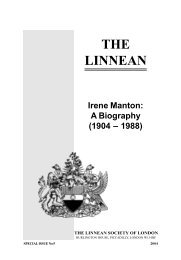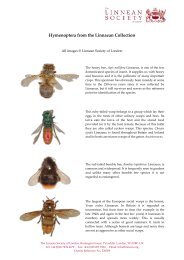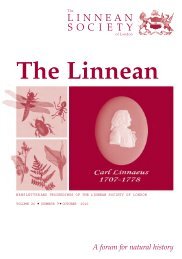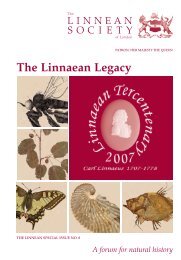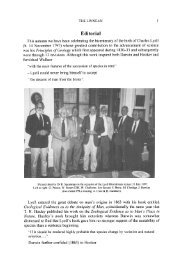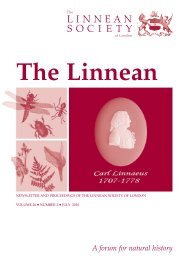Vol 25, no 3, October - The Linnean Society of London
Vol 25, no 3, October - The Linnean Society of London
Vol 25, no 3, October - The Linnean Society of London
You also want an ePaper? Increase the reach of your titles
YUMPU automatically turns print PDFs into web optimized ePapers that Google loves.
30<br />
THE LINNEAN 2009 VOLUME <strong>25</strong>(3)<br />
this time there was <strong>no</strong> pr<strong>of</strong>essional career structure in the Natural Sciences, as we<br />
would understand it. Only those peripheral to medicine <strong>of</strong>fered any sort <strong>of</strong> opportunity,<br />
a fact that was to have important repercussions. Lord Goring was, however, wrong in<br />
seeing the Church and Botany as being mutually exclusive alternatives. Many country<br />
clergymen were also botanists vide Darwin’s Cambridge mentor. Rev. John Stevens<br />
Henslow, who held the University Chair in the subject. Darwin, as we k<strong>no</strong>w, inherited<br />
sufficient wealth and, by his own financial acumen acquired more, so as to obviate<br />
any need for him to earn a living at all. If it had been otherwise I would <strong>no</strong>t be writing<br />
this! Indeed, if Wedgwood had had to call in the administrators 200 years before they<br />
did (Times 7 Jan. 2009) or if Darwin had taken a fancy to medicine and followed his<br />
grandfather, father and elder brother into that pr<strong>of</strong>esssion, if Capt. Pringle Stokes had<br />
<strong>no</strong>t shot himself and/or Lieutenant Skyring had been ratified as the Beagle’s captain,<br />
or, even, if the Beagle had been able to explore the southern shores <strong>of</strong> Gondwanaland,<br />
who k<strong>no</strong>ws where we would be? <strong>The</strong> ‘ifs’ <strong>of</strong> history are frowned upon by historians<br />
but sometimes attempts to reconstruct these virtual scenarios enable us to focus on the<br />
reasons as to why certain things didn’t happen. One <strong>of</strong> the best <strong>of</strong> the crop <strong>of</strong> anniversary<br />
books this year is Nick Spencer’s Darwin and God. This work, by tracing in detail the<br />
reasons for the gradual erosion <strong>of</strong> Darwin’s faith, such as it ever was, prompts us to<br />
question how things would have worked out had Darwin <strong>no</strong>t been disillusioned by<br />
Christianity. However, the unexpurgated version (Nora Barlow, 1958) <strong>of</strong> the<br />
Autobiography makes it quite clear that he was so disillusioned and the rest is history.<br />
Darwin himself was <strong>no</strong>t averse to framing historical ‘if’ questions and certainly<br />
one <strong>of</strong> these, occasioned by his visit to Chile in March 1835, was to initiate a train <strong>of</strong><br />
thought the fruits <strong>of</strong> which we are still reaping. While near the town <strong>of</strong> Concepcion he<br />
witnessed an earthquake that devastated the area. This prompted Darwin to speculate<br />
on what sort <strong>of</strong> mayhem such a catastrophe would produce if it were to hit the British<br />
Isles. It would, he says, result in the destruction <strong>of</strong> private property, public buildings<br />
along with their records and, in short, destroy the whole, apparently stable, perfect<br />
and internal infrastructure <strong>of</strong> society within a few minutes and ‘...violence and rapine<br />
would remain uncontrolled. In every large town famine would go forth, pestilence<br />
and death following in its train’. He was deeply moved by what he saw and it ‘...cast<br />
shadows over the stable, ordered vision <strong>of</strong> nature that supposedly pointed directly to<br />
the deity that Darwin imbibed at Cambridge’ (Spencer p.27).<br />
<strong>The</strong> ‘Darwin Industry’ has provided us with an overwhelmingly massive literature<br />
on Darwin’s ‘Sea Change’. However, in summary, albeit an over simplistic one, by<br />
the time he docked at Falmouth on <strong>October</strong> 2 nd 1836 he had begun to ask how it was<br />
that clear evidence pointed to the fact that Nature was <strong>no</strong>t perfectly harmonious,<br />
anthropocentric, and stable, presided over by a benevolent Deity as depicted in the<br />
popular painting, by Edward Hicks. ‘<strong>The</strong> Peaceable Kingdom’ (1820). Nature was, in<br />
fact. dynamic, capricious and, above all, indifferent to human life. In fact, the very<br />
opposite to what his Anglican upbringing had led him to believe and which, up to that<br />
point, he had indeed believed. Charles Darwin had begun to frame some very difficult<br />
questions many <strong>of</strong> which we are still attempting to answer.<br />
It was the received wisdom surrounding the intertwined ideas <strong>of</strong> stability, perfection<br />
and purpose about which Darwin came to have doubts. Furthermore, he came to be



